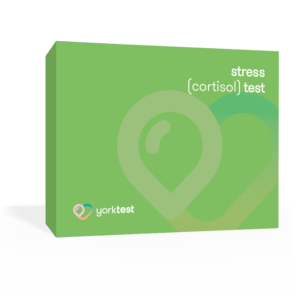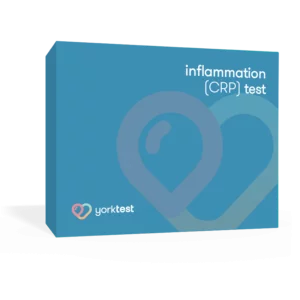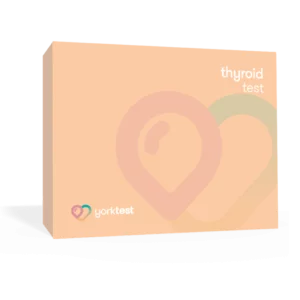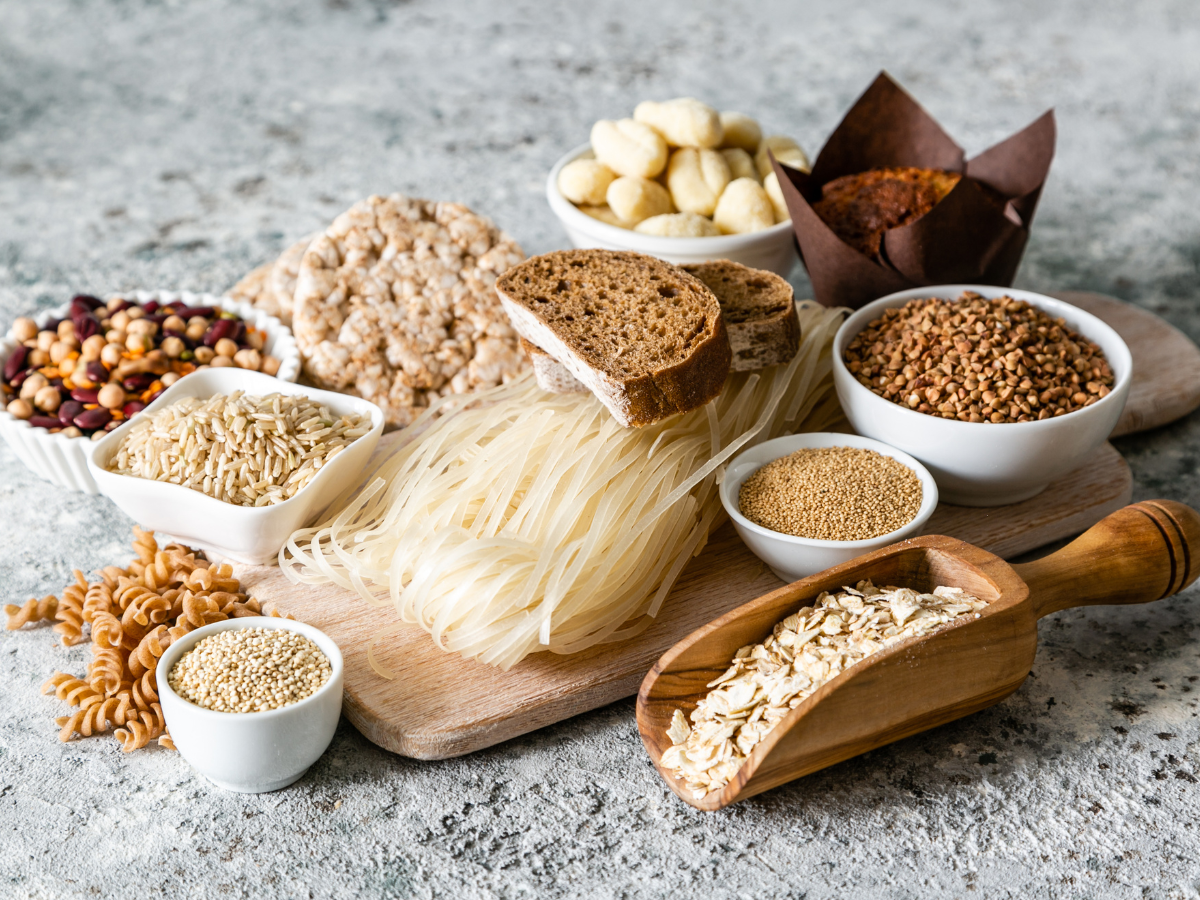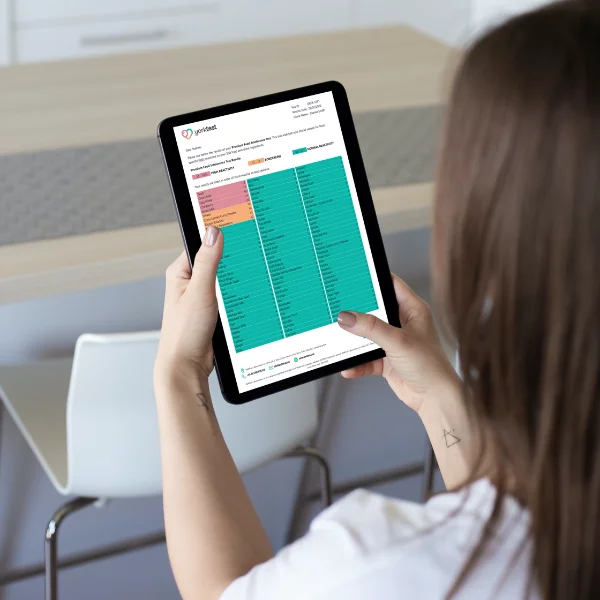- Prevalence of IBS symptoms in women versus men
- IBS subtypes: not all symptoms are treated equally
- Causes of IBS in women
- Genetics and Heredity
- Psychological Factors
- Hormones
- Gut Health
- Signs and symptoms of IBS in women
- Gastrointestinal symptoms
- Other common symptoms
- Managing IBS in Women
- Diet
- Exercise
- Medication
- Stress Reduction
- Food intolerance testing to help manage your IBS
Irritable bowel syndrome (IBS) is a common gastrointestinal (GI) disorder that significantly diminishes the quality of life in both men and women. In the UK, IBS affects between 10-20% of the population. However, research has repeatedly found that women are far more likely than men to report suffering with IBS.
One study showed that women reported having IBS symptoms more frequently than men by a ratio of 6:10.
These gender differences are not fully understood, and there is some debate that rather than a true gender difference in prevalence these statistics reflect that women are more likely to report their IBS symptoms or visit a specialist. But there is also some evidence that the specific symptoms and subtypes of IBS vary by gender.
In this article, we’ll delve into what those differences are and how IBS affects women and men differently, including symptoms, genetics, hormones, and overall quality of life.
Prevalence of IBS symptoms in women versus men
In the UK and internationally, it’s no secret that the reported rates of IBS are more common in women than they are in men. According to the British Journal of Medical Practitioners, the overall prevalence of IBS in the UK is estimated to be 17%, with a prevalence of 11% among men and 23% among women.
Based on these figures, the discrepancy between IBS rates in women and men is even greater, with females outweighing males by about 2:1.
IBS subtypes: not all symptoms are treated equally
The different subtypes of IBS are a critical distinction in understanding the nature of IBS symptoms in women. IBS is typically classified into four subtypes: constipation-predominant IBS (IBS-C), diarrhoea-predominant IBS (IBS-D), mixed IBS (IBS-M), and untyped IBS (IBS-U).
In short, symptoms of IBS-C are more common in women whereas the symptoms of IBS-D are predominant in men. According to a systematic review and analysis conducted across several different studies regarding IBS gender differences, women were more likely to report abdominal pain and constipation-related symptoms. Conversely, men with IBS were more likely to report diarrhoea-related symptoms.
Furthermore, many chronic pain disorders that frequently overlap with IBS – such as migraine headaches, chronic fatigue syndrome, fibromyalgia, and pelvic pain – are greater in women compared to men with IBS, indicating an association between hormonal status and IBS symptoms.[7] But hormones alone are just one potential trigger.
Causes of IBS in women
IBS in women is associated with a number of possible causes, however regardless of gender there is no established cause for the condition. The body of research on IBS in women suggests that a combination of genetic, psychological, and hormonal factors may be involved.
Genetics and Heredity
Both genetic and hereditary factors have been shown to influence the development of IBS in women. An international research team led by the Karolinska Institutet in Sweden identified specific DNA variants that are attributed to elevated IBS risk in women but not in men. This DNA variation has been previously reported to play a role in puberty timing or the age of first menstruation.
Looking at the heritability of IBS, studies have shown that individuals who have relatives with IBS are 2 to 3 times more likely to also have IBS, or a related gut disorder. Another Swedish study from 2014 found that the risk of IBS is higher among first, second, and third-degree relatives, further suggesting some genetic influence.
Psychological Factors
It’s important to remember that IBS is a very real condition, with impactful physical symptoms. The idea that IBS suffers’ symptoms are “all in their head†is harmful and dismissive. Women are particularly likely to feel dismissed by doctors, with a 2022 survey by the UK government reporting that 84% felt they weren’t listened to by healthcare professionals.
That being said, there is evidence that the gut-brain connection plays a key role in IBS.
The brain and the gut “overshare†information and because people with IBS have an overly sensitive gut this results in symptoms.
One of the largest international studies on this subject further validated the link between IBS and psychological factors. Not only did the study find that common mood and anxiety disorders increase the risk of IBS, but neuroticism and insomnia also played a role. These findings, however, do not indicate a direct causation between anxiety and IBS, or vice versa.
Hormones
There is a clear relationship between certain female hormones and their impact on gut motility. Both oestrogen and progesterone are hormones known to interfere with the gut’s autonomic muscular contractions that enable proper digestion. This hormonal connection is thought to explain some reasons why women tend to experience symptoms of IBS-C far more often than men.
Women report experiencing more frequent and severe IBS symptoms during menstruation. These symptoms manifest as severe bloating, increased abdominal pain, and soft bowel movements during the menstrual cycle. Also, during perimenopause and menopause, fluctuations in hormone levels can also trigger heightened IBS symptoms.
Gut Health
Not limited to women, overall gut health and the consumption of antibiotics have been shown to influence IBS symptoms. It is widely known that the consumption of fibre, pre- and probiotic-rich foods, and a nutrient-dense diet can all support better digestion, gut health, and overall well-being.
The introduction of gut destroyers like antibiotics can wreak havoc on our systems. Antibiotics upset the balance of bacteria in the gut, which can destroy the integrity of good bacteria. Otherwise known as dysbiosis, any imbalance in gut health can exacerbate IBS-related disorders.
Signs and symptoms of IBS in women
IBS affects women in a wide range of ways. The myriad of signs and symptoms can be as difficult to pinpoint as the causes of one’s IBS. Based on what we do know, some of the most frequent signs of IBS in women include:
Gastrointestinal symptoms
- Abdominal pain or discomfort is a hallmark symptom of IBS in women, often characterised by sharp and dull cramping. These symptoms can be localised in one area or spread throughout the abdomen. Related symptoms may include the urgency to have a bowel movement, lingering pain after passing stool, or pain that worsens after eating.
- Changes in bowel movements are common in IBS, particularly diarrhoea, constipation, or alternating between the two. As previously mentioned, women more commonly experience IBS-C symptoms, so constipation and stool consistency are the most commonly affected aspects of bowel movement.
- Bloating and excessive gas can be uncomfortable symptoms of IBS. The abdomen may feel full or distended, and gas may be expelled as flatulence or burping. Eating certain foods or drinking carbonated beverages may worsen these symptoms.
- Nausea and vomiting can occur in women with IBS, particularly after meals or in response to increased stress. These symptoms can be accompanied by acid reflux, heartburn, or a sensation of food getting stuck in the throat.
- Fatigue and a general feeling of malaise may accompany IBS, possibly due to disrupted sleep, stress, or decreased physical activity. Many women experience corresponding symptoms like headaches, muscle aches, or joint pain.
Many individuals with IBS report that certain foods can trigger or worsen their gastrointestinal symptoms. YorkTest has helped thousands of women, like Dorothy and Kate, to identify their trigger foods with a food intolerance test and use that information to start an elimination diet. 82% of our customers report feeling health benefits after taking a test and changing their diet.
Other common symptoms
- Anxiety and depression are subsequent symptoms that result from IBS due to the impact it has on quality of life. These symptoms may worsen during flare-ups and can lead to social isolation, decreased productivity, or avoidance of certain situations or foods.
- Pain during sex can be experienced by some women with IBS due to the pressure on the abdominal area during intercourse. This can cause discomfort or pain during or after sex.
- Urinary symptoms like the urgency, frequency, or feeling of pain during urination – can manifest as symptoms. This may be due to the proximity of the bladder to the colon and rectum, which can become inflamed or irritated due to IBS.
- Lower back pain or discomfort is a commonly reported symptom of IBS in women. This may be due to the close relationship between the nerves and muscles in the gut and those in the low back.
- Food intolerances are another culprit. Many individuals with IBS report that certain foods can trigger or worsen their symptoms, such as gluten, dairy, alcohol, caffeine, and spicy or fatty foods.
Managing IBS in Women
There are various forms of management of IBS symptoms in women. The optimal form of management depends on the type of IBS a woman has, such as constipation-predominant, diarrhoea-predominant, mixed, or unclassified. With this in mind, there are a handful of effective relief tips that generally focus on a combination of the following:
Diet
Dietary changes can play a significant role in managing IBS symptoms. Women with IBS may benefit from avoiding particular foods and beverages that trigger their symptoms, such as high-fat foods, caffeine, alcohol, and spicy foods. Some women may find it helpful to follow a low-FODMAP diet, which involves avoiding certain types of carbohydrates that are poorly absorbed in the gut.
Whilst there is good evidence that a low FODMAP diet can help those with IBS, many foods contain FODMAPs. However, removing all FODMAP foods is too drastic. Often people react to some types of high FODMAP foods – for example those containing polyols, like apples, but do not react to other types of high FODMAP foods, like wheat or milk. But there’s a lot of trial and error to work this out through an elimination diet alone.
Many IBS sufferers have food intolerances which can trigger a flare-up regardless of the FODMAP status of the food. One research study showed that Food IgG testing, like the YorkTest Premium Food Intolerance Test, provided better improvement in IBS symptoms than an elimination diet alone. In other words, taking the food intolerance test helped to pinpoint the priority foods for elimination.
Exercise
Regular exercise can help manage stress and promote bowel regularity, which can help keep IBS symptoms at bay. Exercise can also help reduce anxiety and depression, which are common in women with IBS. While a combination of aerobic and strength-training exercises may be most effective, a simple movement like regularly walking can be helpful.
Medication
There are several types of medications that can help manage IBS symptoms. These include antispasmodics, which can help reduce abdominal pain and cramping, and laxatives, which can help with constipation. In some cases, antidepressants may be prescribed to help manage IBS symptoms, however, it’s crucial to avoid introducing any medications that may inadvertently disrupt one’s gut and trigger IBS flare-ups. You should always contact your GP first and only take medication under their advisement/prescription.
Stress Reduction
Stress and anxiety can trigger IBS symptoms in some women. Techniques such as meditation, yoga, and deep breathing can help manage stress and reduce symptoms. Counseling or therapy may also be helpful for managing the emotional impact of IBS.
Food intolerance testing to help manage your IBS
For many women experiencing symptoms of IBS, diet and food choices play a significant role. Identifying which foods may be IBS triggers is important knowledge that can help improve one’s quality of life.
YorkTest’s Premium Food Intolerance Test is a simple yet comprehensive home-to-laboratory test kit that can help you determine whether you have a reaction to 200 different food and drink ingredients. As a step towards managing IBS, this easy-to-use finger-prick blood test covers all four subtypes of food-specific IgG, providing insight into any food intolerances that may be flaring up your IBS symptoms.




